It's nearly 11 o'clock" There are some differences that need to be noted, however, to use them properly "Must" is an example of a modal verb Here are some examples of other modal verbs can, could, shall, should, ought to, will, would, and might They are used to with other verbs to express ideas like possibility and necessity Sometimes, "must" and "have to" can be used to speak about responsibilities However, "must" is generally used for strong personal obligations and "have to" is used for responsibilities at work and in everyday life I must do this right now!

Modals Permission And Obligation Grammar Intermediate To Upper Intermediate British Council
Must have to can quiz
Must have to can quiz- It has a very similar meaning to obligation and can therefore be a more polite way of saying 'must' or 'have to' Unusually, 'need' is both a normal verb and also a modal verb In almost all cases you can simply use the normal verb form which has a regular structureThe exam is at 8 have got to In spoken informal English, you can often use 've got to instead of have to I can't stay;




Have To Must And Should For Obligation And Advice Learnenglish Teens British Council
What is the difference between MUSTN'T & DON'T HAVE TO?However, have got to is mainly used to talk about obligations that come from outside On the other hand, must is mainly used to talk about the feelings and wishes of the speaker and the hearer In American English, have to is more common than must Complete the following sentences using must Must dapat digunakan pada present dan future, sedangkan have to digunakan pada present dan mempunyai bentuk past "had to" serta future "will have to" must dan have to Must dan have to kadangkadang dapat saling menggantikan, namun secara umum ada perbedaan mendasarMust digunakan ketika seseorang yang memutuskan bahwa perlu untuk melakukan
Must I chair the meeting?Have to, don't have to, must, mustn't (1) Type the correct answer into the box Use contractions where possible Youhave a passport if you want to travel abroad Youarrive late Youstand on the plane There are seats for everyoneHave to / has to Must not do not have to Must / can quiz Must / mustn't exercises 1 Must / mustn't exercises 2 I have to walk the dog Permission obligation prohibition Don't have to / doesn't have to Modals of necessity must / have to
In this lesson, you can learn about the modal verbs must, have to and shouldDo you know the difference between 'must', 'have to' and 'should'?Learn more English tips at httpWhat is the difference between MUST & HAVE TO?
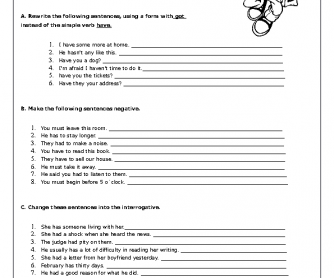



81 Free Must Worksheets




Modal Verbs Must Have To Can Should Con Ejemplos Y Explicado En Espanol Idiomas Youtube
"Have to" can be used as a main verb "Must" is a modal verb, and it can not be used as a main verb, so a main verb must be added, to the sentence when using "must" Must is used for to state personal personal obligation or respectability there is no rule or law I must go to the storeIn English, we use "must" and "have to" to express a strong rule or law In this grammar les Modal auxiliaries can have more than one sense The verb must for example can be used to talk about obligations what people think it is a good idea or bad idea to do (Some people call this type of meaning deontic modality) Here's an example You must be in class by 9 am Here someone is saying that you have an obligation to be in class by 9 am
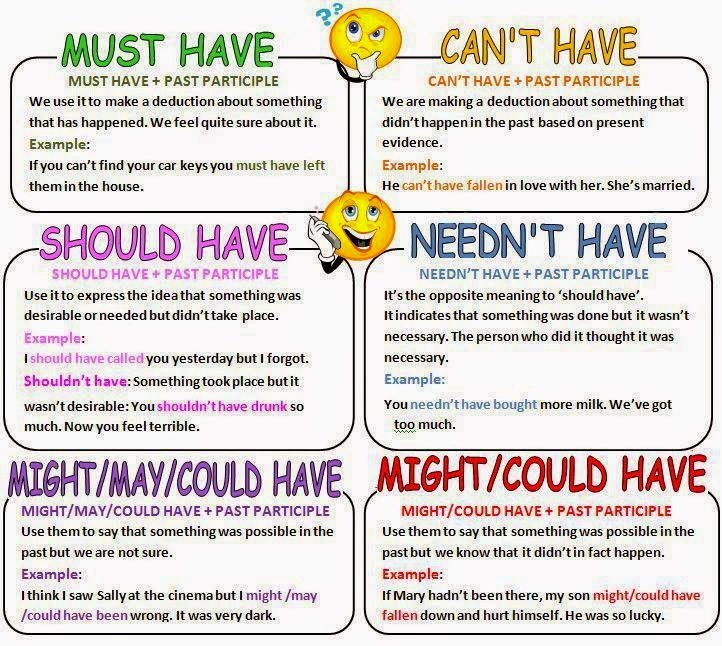



Modal Verbs And Its Types Eage Tutor




Modal Verbs Can Must Mustn T Should Have To Worksheet
Both must and have got to can be used to talk about necessity They are usually interchangeable;Should = used for give advice (not as strong as the words above);Explanation Modals in English Grammar can, can't, cannot can and must in sentences and questions can – to be able to/to be allowed to may – to be allowed to must, have to, mustn't, needn't Questions with can What are modal auxiliaries?




Modal Verbs Modals Are Helping Verbs That Do
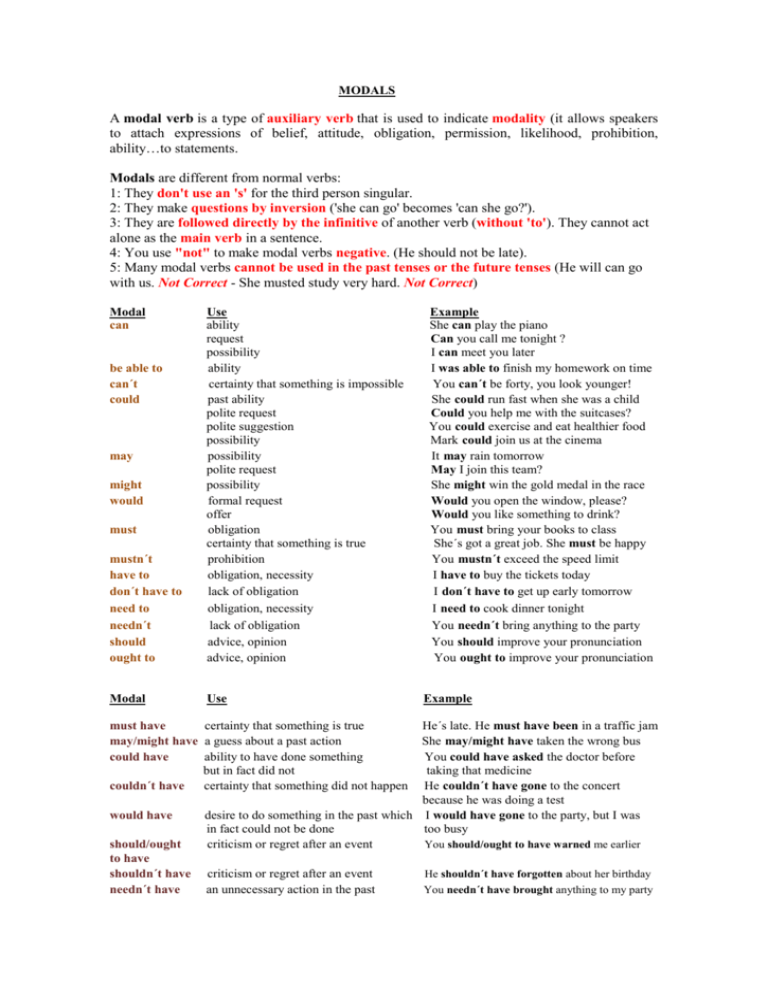



Modals A Modal Verb Is A Type Of Auxiliary Verb That Is Used To
Have to, must Have to is NOT an auxiliary verb (it uses the verb have as a main verb) We include have to here for convenience Must is a modal auxiliary verb In this lesson we look at have to, must and must not, followed by a quiz to check your understanding have to for objective obligation We often use have to to say that something is obligatory, for example Children haveMust/mustn't, have to/don't have to – form Download fullsize image from must/mustn't Use must infinitive without to Must is a modal verb, and modal verbs are followed by infinitive without to I must go to the doctor (NOT I must to go to the doctor;Do we say "I must do my homework" or "I have to do my homework"?




Must Mustn T Can Have Don T Have To English Esl Worksheets For Distance Learning And Physical Classrooms




Must Vs Have To Must Not Vs Don T Have To 7esl
Must vs have to Both Must and have to express obligation or necessity, but there are some small differences • Must expresses the speaker's feelings, whereas have to expresses, above all, an impersonal idea You must come You are obliged to come (I require that you come) You have to come You are obliged to comeYou must/have to follow the doctor's advice (Tienes que/Debes seguir el consejo del médico » Have to implica que yo no lo impongo;We use "have to" for obligation We use "don't / doesn't have to" for no obligation We use "can't" to say that something isn't allowed Can and Have To Choose the correct answer Start Quiz Speak English Fluently!




Must Mustn T Can Have Don T Have To English Esl Worksheets For Distance Learning And Physical Classrooms
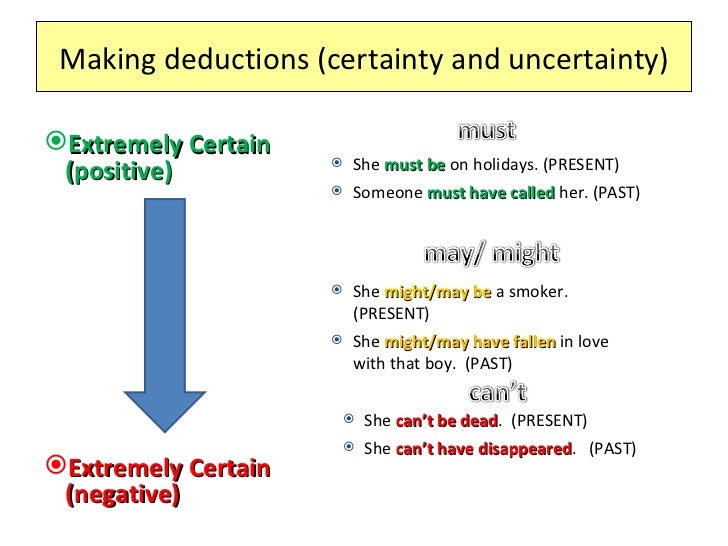



Modal Verbs For Deduction Grammartop Com
Weird Laws Pairwork must, have to, allowed to, can´t etc Level intermediate Age 1417 Downloads 194 CAN/CAN´T HAVE TO/DON´T HAVE TO Level intermediate Age 1217 Downloads 186 CAN OR MUST Level elementary Age 1017 Downloads 186 recycling activities Level elementary Age 1114 Downloads 1 must or mustn´tHad better is usedSome tips about confusing modal verbs Created using PowToon Free sign up at http//wwwpowtooncom/ Make your own animated videos and animated presen




Modal Verbs 1 Can Can T Could Must Mustn T Have To Don T Have To May May Not Docsity




Modals Must Have To Should Ought To Can
Practice must and can modal verbs using this ESL fun GameThis game is also excellent for classroom teaching Teachers can engage students in a classroom vocabulary or grammar review It is suitable for intermediate and advanced esl learners It can be used to energize a dull class, to review work that was done or simply as a reward for good classroom work HaveWe use "must have", "can't have" and "might have" in the same way as the present perfect the action we are describing happened, or did not happen, in the past and is still true in the present "must have" we believe the action definitely happened "She must have left the house by now;Must è un verbo modale ( ovvero come can, could, may, would ecc ), quindi al presente non prende la s alla 3° persona singolare ed è sempre seguito dal verbo alla forma base Must indica un
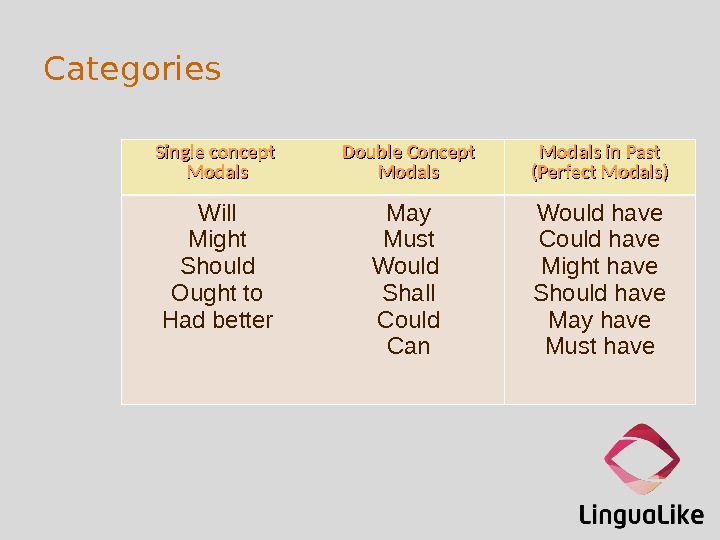



Modal Verbs What Is A Modal Verb




Have To Must And Should For Obligation And Advice Learnenglish Teens British Council
Must / Have to "Must" y "Have to" expresan una obligación A veces se pueden utilizar indistintamente (especialmente con la primera persona donde prácticamente tienen el mismo sentido), no obstante existen ciertas diferencias "Must" se utiliza con el tiempo presente y futuro "Have to" con pasadLos verbos modales "can" / "can´t", "could", "will", "shall" Los verbos modales "can't have" / "must have" / "might have" Verb conjugation practice Contenido de suscripción Los verbos modales must, have to, should, should have Modals must, have to, should, should haveCan vs Be Able To With Tenses 3 Can vs Could Exercise 4 Can Can't Exercises 567 Mustn't vs Don't Have to Exercises 1 / 2 / 3 10 Must vs Have to / Has to Exercises 1 / 2 / 3 11 Must / Mustn't / Needn't / Have to 1213 Modals With Passive Voice 1 / 2 14 Mustn't vs Needn't vs Can't Similar Exercises MODALS V3 Practice Test Ought to




Modal Verbs Modal Verbs Must Should Can Could
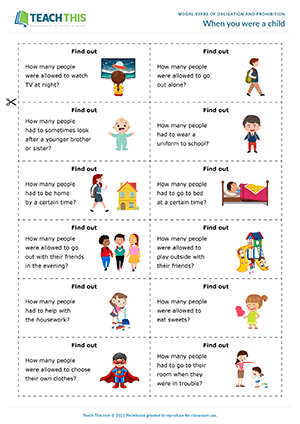



Modals Obligation Prohibition Esl Activities Games Worksheets
Learn English Mark Kulek ESL Use Must for personal duties and Have To for obligations More Practice https//youtube/M6zvuKb4ChU Everyday activitiesMust and have to are much broader They can both be used to say that something is required or necessary We must go to the post office = We have to go to the post office They can both be used to say that something is required by law You must file your taxes by April 15th = You have to file your taxes by April 15th They can also both be used to say that something is very likelyAs we can see, the inversion is the only thing that changes from the structure in the affirmative How do we make questions with "to have to"?
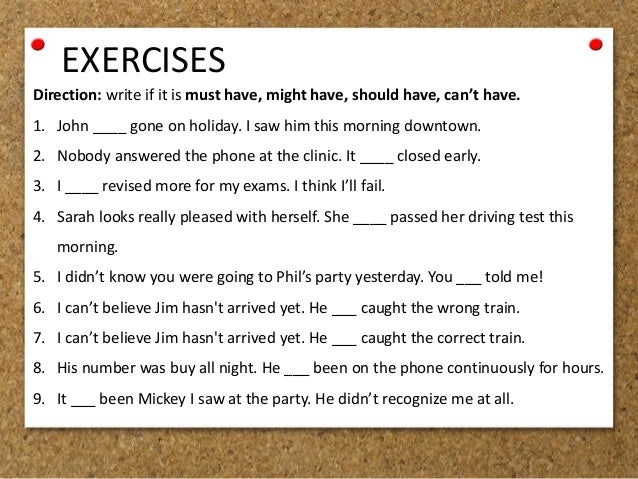



Must Have Might Have Can T Have Exercises Exercise Poster




Modal Verbs Can Can T Must Mustn T Have To Don T Have To Ppt Download
I'm Clare, an English teacher and the founder of this site 1 Must and Have To Must and have to are both used to talk about obligations things you cannot choose not to do For example We must talk to her before she leaves I have to go into work early tomorrow If you say, We must talk to her before she leaves, you mean that you think this is very important, and you need to do it When you say, I have to go into work early Have To vs Must There is a slight difference between have to and must though they both seem to convey the same meaning In fact, it can be said that must and have to are two different words that give different senses and not the same meaning Must is known as a modal verb in the English language while have to is a verb Have to is a variation
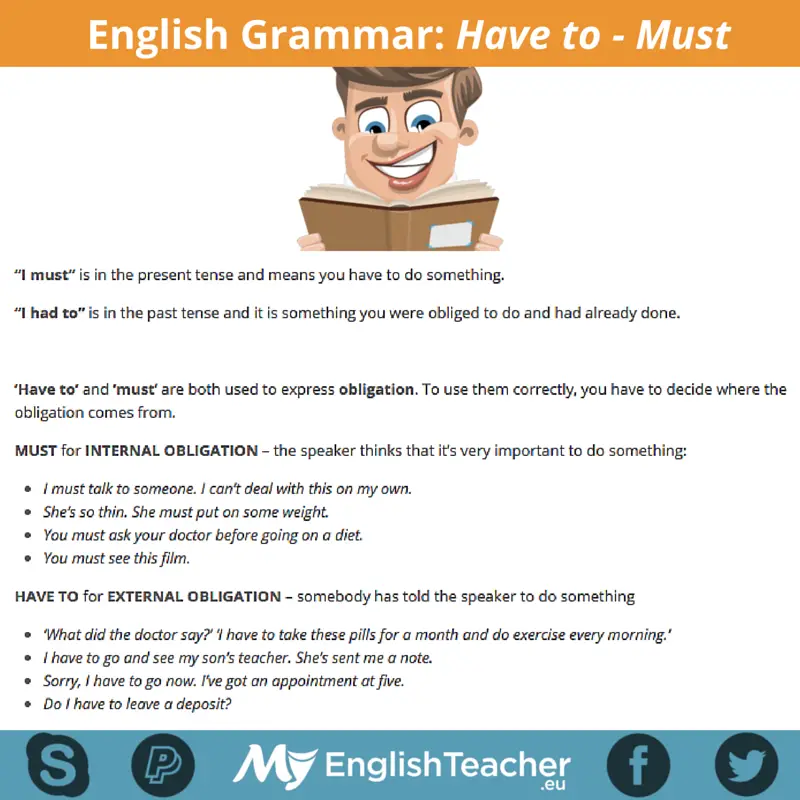



I Had To I Have To Or I Must What Is The Difference Myenglishteacher Eu Blog




Must Mustn T Can Can T Have To Don T Have To English Esl Worksheets For Distance Learning And Physical Classrooms
What is the difference between MUSTN'T & DON'T HAVE TO?Must English Grammar Today a reference to written and spoken English grammar and usage Cambridge Dictionary While must is a modal verb, have to is a semimodal verb, in the sense that as a modal verb it is used along with the verb to express necessity, but acts like a normal verb in its formulation Both must and have to talks about obligation, but must highlight a personal obligation, and have to outlines an external obligation




Can Must Should Worksheet




Modals Of Deduction Might May Can T Must Worksheet
Can we always use them in the same way?Must not do not have to Must / have to / should Modal verbs must and mustn't Necessity must / have got to Obligation, necessity and permission 1 Obligation, necessity and permission 2 Obligation, necessity and permission 3 Mustn't or needn't exercises Modals of obligationStudy Zone / Level 330 — Lower Intermediate / Grammar Topics / Modals with "Not" 1 Must not, Do not have to Modals with "Not" 1 Must not, Do not have to Modals with "Not" 1 Must not, Do not have to Choose the best modal for each sentence




Should Must




Test English Prepare For Your English Exam
There is a small difference between how we use the semimodal verb had better compared to other modal verbs like have to/must or should had better = used for strong advice; Outline Ask students to talk about their daily routines Have them make a list of five things that they have to do every day Introduce the grammar by having the students take a look at the grammar sheet below Discuss the differences between 'have to' and 'must' in the positive form Make sure to point out that 'have to' is used for daily The candidate must have completed all other preliminary credential requirements They must complete the assessment before earning a full credential " The goal of testing is to ensure teacher candidates are ready to begin preparation, " Sandy said "We have to reduce the size of the roadblock"




Modal Verbs Must Have To Can Could Should Mustn T Don T Have To Can T Couldn T Shouldn T Ppt Download
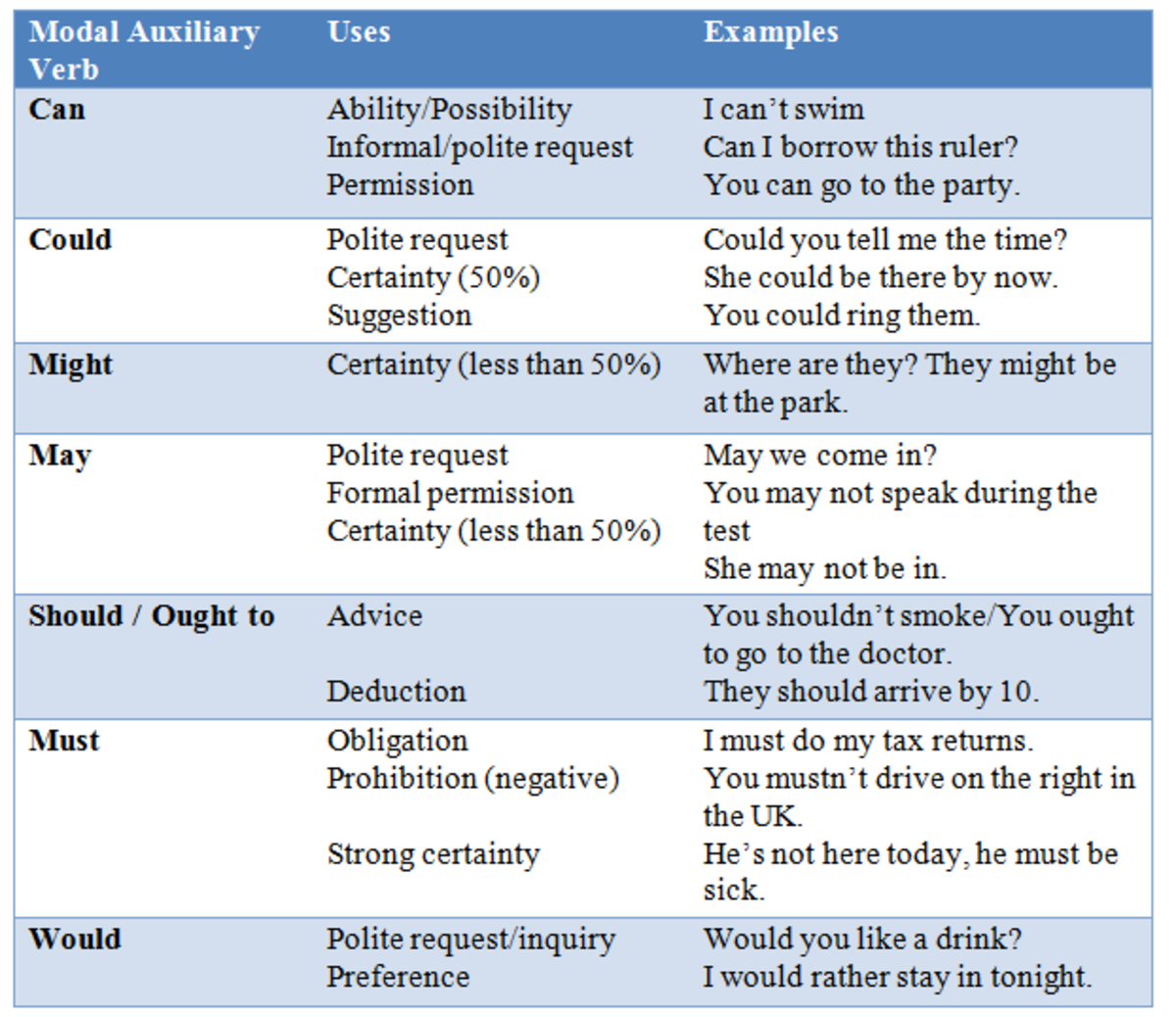



10 Fun Esl Activities To Practice Modal Auxiliary Verbs Owlcation
Unlike "must" where we just make an inversion to create the interrogative,What I can say is that 'must have done' and 'should have done' have different meanings 'must have done', for example, is often used to make deductions about the past, and 'should have done' can be used to speak about something that didn't happen (eg 'He should have gone to school' implies that he didn't go to school)Must, que, pese a no ser decisión mía, comparto la opinión del médico) a I _____ go home on foot no means of transport can take me there b He _____ work twelve hours a day to maintain his family
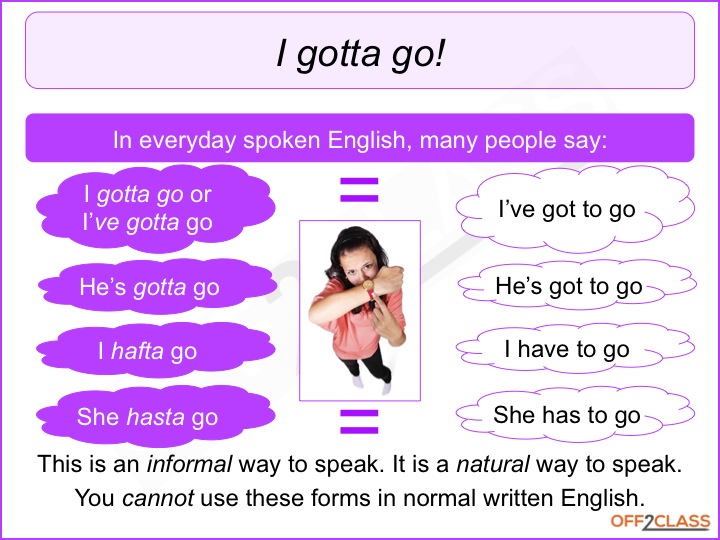



Teaching Must And Have To Necessity Modals Off2class
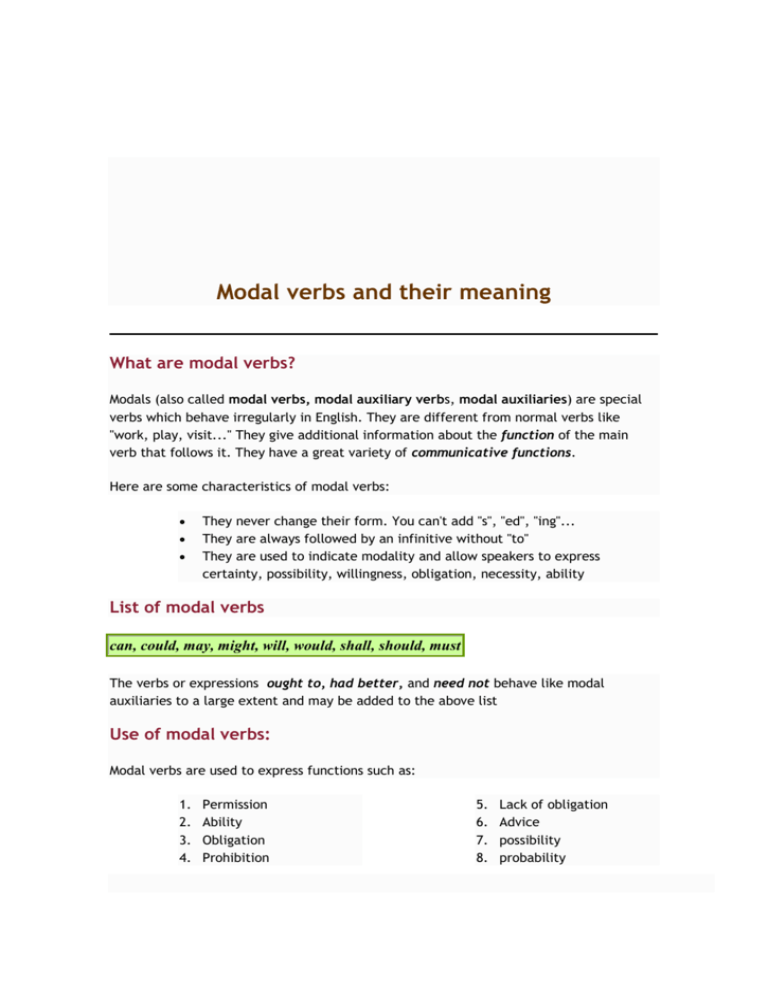



Modal Verbs And Their Meaning
While questions with "must" are grammatically correct, it is more usual nowadays to use "have to" for questions There is no past form of must for obligation We had to show our passports at the border We weren't allowed to use calculators in the exam Or, we couldn't use calculators inLet's find out in today's Confident English lesson Need to vs have to vs must can be used as synonyms Sometimes That's the good news Generally, they all mean that you're talking about a responsibility, an obligation, or something that is important to do This is where they are similar4 rows MUST 1) Ability I can drive 2) Possibility I can come 1) Obligation I must do my
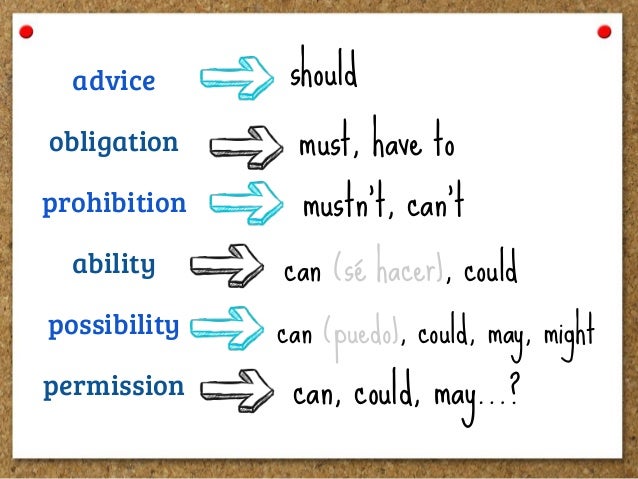



Modals Can Could May Might Should Have To Must




The Difference Between Must Have To Shall Need And May
Online quiz to test your understanding of HAVE TO and MUST in English This is a free multiplechoice quiz that you can do online or print out For ESL learners LEARN TEACH MYEC eBOOKS 2 plus 2 still equals 4 Tuy Must/Have to/Ought to có ý nghĩa tương đương nhau nhưng tùy trường hợp mà chúng có những cách sử dụng khác nhau đấy nhé Trong bài viết này, Language Link Academic sẽ giới thiệu những cách sử dụng các động từ này trong từng văn cảnh nhéModal verbs worksheets Can, can't, could, couldn't, must, mustn't Modal verbs 1 Modal verbs 2 Modal verbs 3 Modal verbs obligation Ability and permission worksheet Modal verbs pdf handout Modal verbs exercises




Must Mustn T Can Have Don T Have To English Esl Worksheets For Distance Learning And Physical Classrooms




Modal Verbs Can Could May Might Should Ought To Must Have To Ppt Video Online Download
We use have to / must / should infinitive to talk about obligation, things that are necessary to do, or to give advice about things that are a good idea to do Mus t and have to are both used for obligation and are often quite similar They are both followed by the infinitive I must go nowMust = used for strong advice, obligation, and rules;No s Modal verbs don't add s after he/she/it He must come with us (NOT He must comes with us




Expressing Must Can T Should Needn T Might May Could Have English Learn Site



Modal Verbs Different Usage And Meanings A Handy Summary
Have to = used for strong advice, obligations, and rules;I' ve got to go to the supermarket must Must is a modal verb and it has a present form, which can be used to talk about the present or the future The negative form is must not or mustn't and the question is must I




Teaching Must And Have To Necessity Modals Off2class
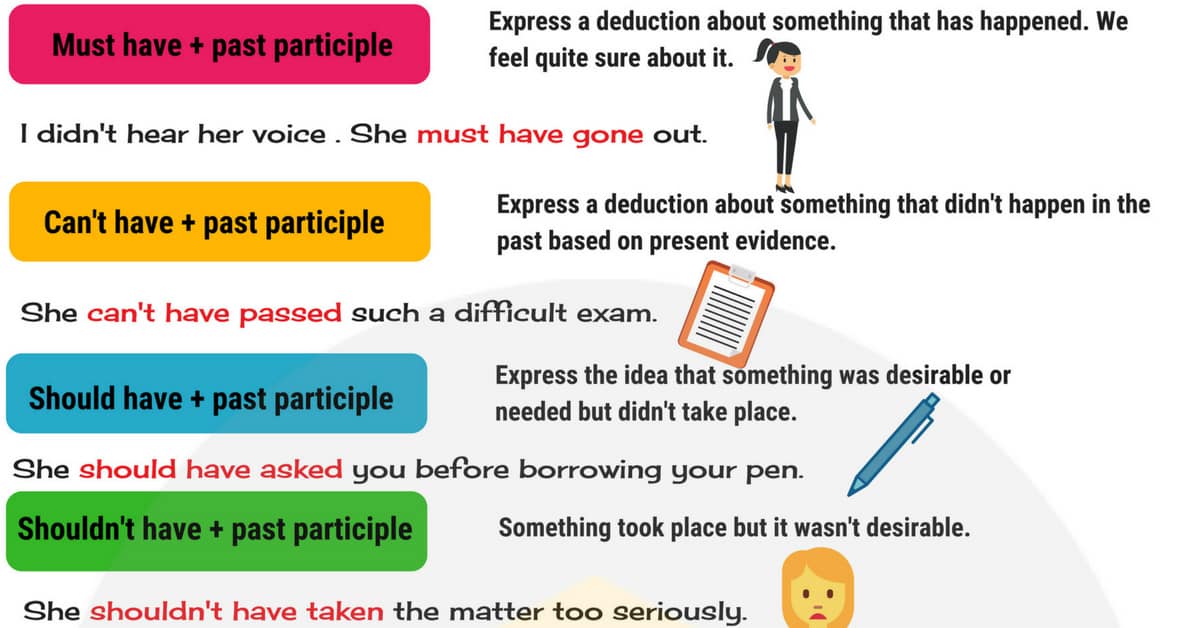



Perfect Infinitive With Modals Could Have Would Have 7esl




Modal Verbs Must Have To




Class Rules Modals Teaching Material




English Grammar Must And Have To Mustn T And Don T Have To Eslbuzz Learning English Learn English English Grammar Teaching English Grammar




Ana S Esl Blog Modal Verbs For Eso 3 Students




The Modal Verb Must In English Also Must Vs Have To Modalverbs English Grammar Woodward English Learn English




Test English Prepare For Your English Exam




Can Must Should English Esl Worksheets For Distance Learning And Physical Classrooms




Mustn T Must Can T Online Presentation




Modal Verbs What Is A Modal Verb




Uso De Must Y Can T Verbos Modales En Ingles Ringteacher
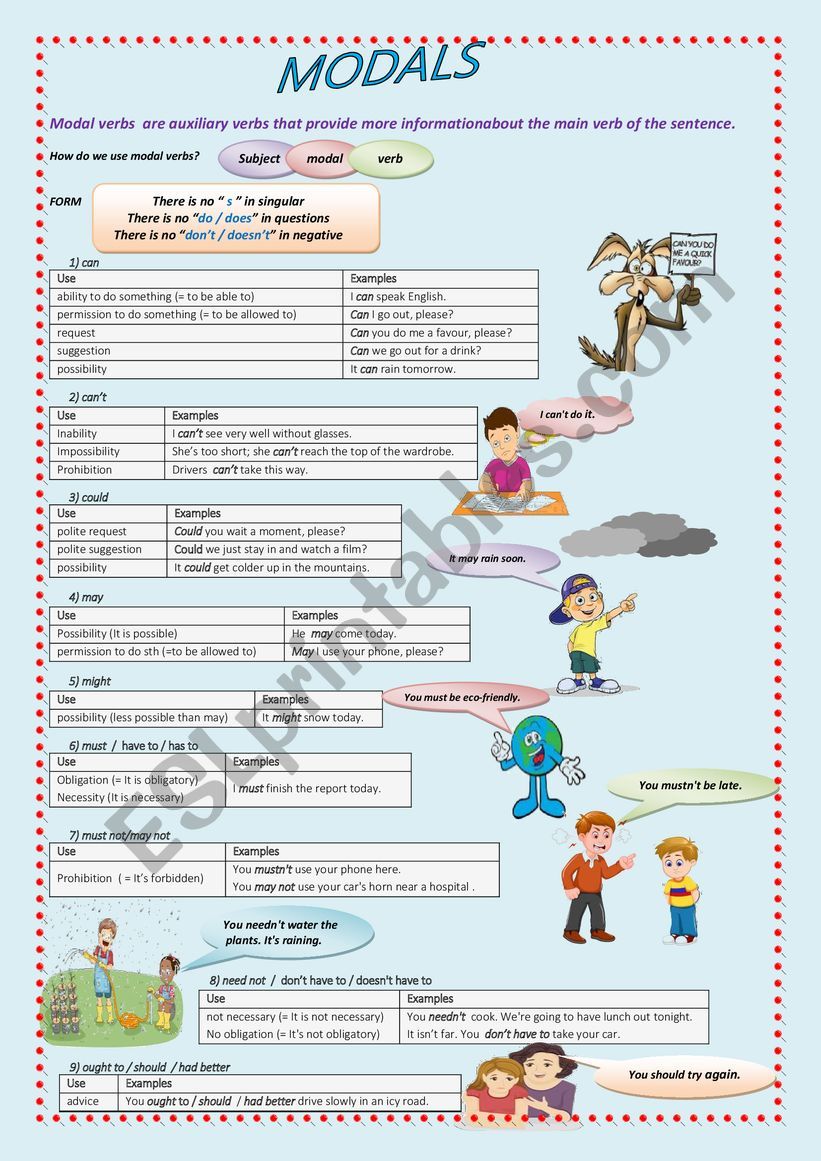



Modal Verbs Can Must Mustn T Needn T Esl Worksheet By Benyoness




The Difference Between Mustn T And Don T Have To In English English Grammar Learn English English Grammar Rules



General Rules Modal Verbs



1



Fadeibuoni Files Wordpress Com 17 03 Musthaveto2 Pdf
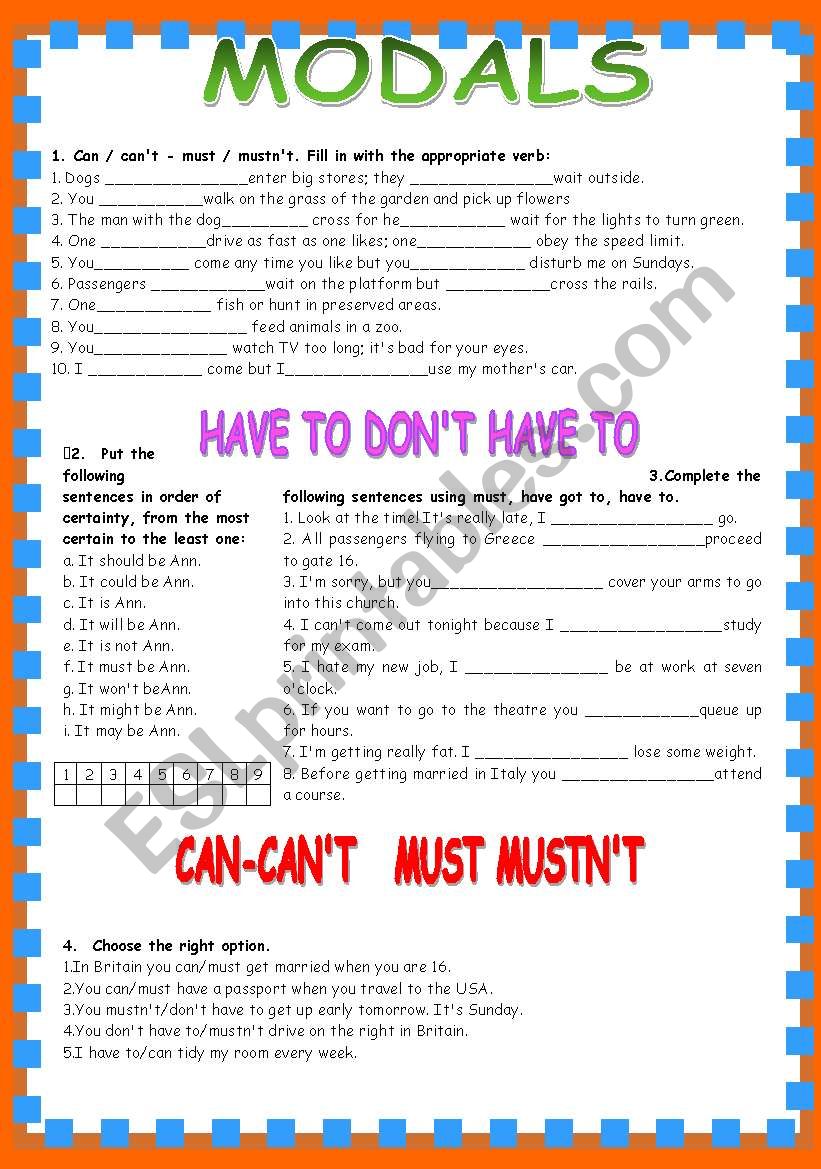



Modals Can Can T Have To Don T Have To Must Mustn T Should Shouldn T Esl Worksheet By Patties
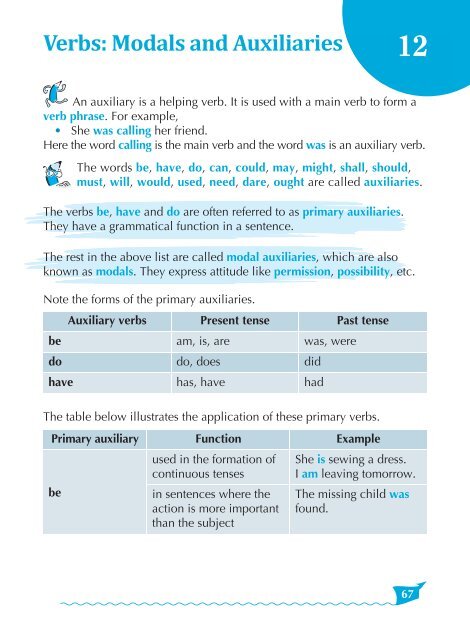



Verbs Modals And Auxiliaries Pearson




How To Teach May Might Could Must Off2class




Must Have To Exercises




English Grammar Modal Verbs Of Certainty Might May Must Can Youtube




Must And Have To Exercises




Modal Verbs Must Mustn T Have To Don T Have To Can Be Able To Esl Worksheet By Esther1976
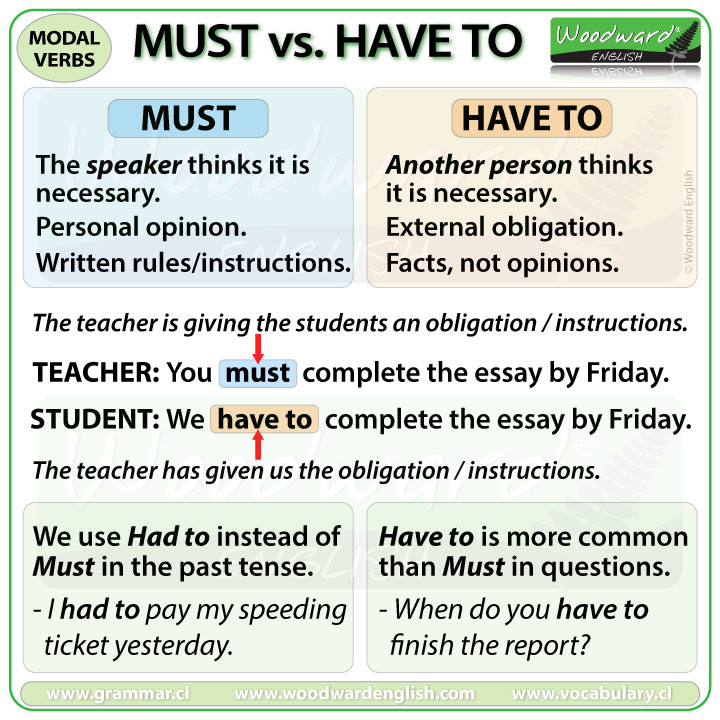



Must Vs Have To Woodward English




Must Vs Have To Woodward English




The Difference Between Must Have To Shall Need And May




Modals Permission And Obligation Grammar Intermediate To Upper Intermediate British Council
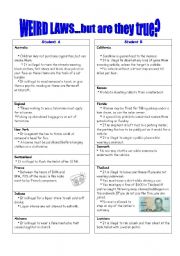



English Exercises Can Or Must
/sign-warning-people-of-fines-for-feeding-wildlife-in-a-park-at-arakoon-in-new-south-wales--australia-847527992-5bc9d8c246e0fb0026d028e0.jpg)



How To Use Must Have To And Need To In English




7 Modals Of Necessity Examples And Definition English Study Here



Q Tbn And9gcqre S57keb7xjdfux7 Vb8b4trxvyaz4jn Wgdmevbm1efsywu Usqp Cau



English Worksheets Must Have To Worksheets
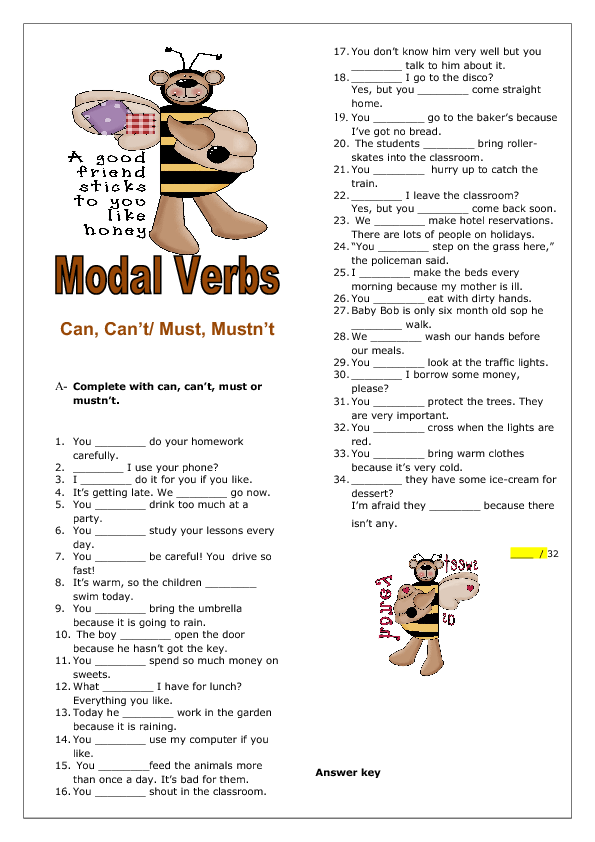



Can Can T Must Mustn T Elementary Worksheet



Modal Verbs In Urdu Pdf Archives Ea English




Must Vs Have To Woodward English




Ana S Esl Blog Modal Verbs
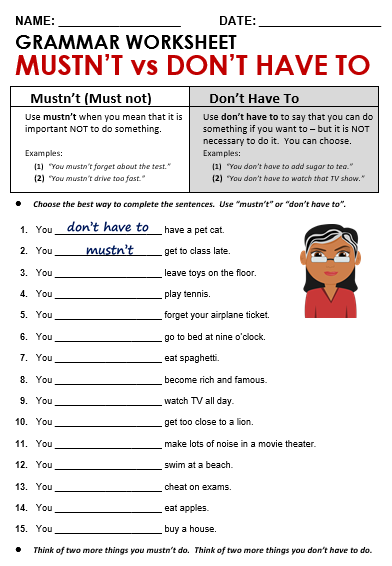



Must Necessity All Things Grammar




Modals Of Necessity Definition And Example Sentences Lessons For English




Must Or Have To Worksheet




Modal Verbs Reading Text Photocopiables



I Am Not Sure How To Use The Words Can Could May Might Should Ought Must Have To Shall Will Or Would Are There Any Easy Rules To Use These Modals Correctly




Test English Prepare For Your English Exam




Modal Verbs Carmen Torres What Are Modal Verbs




Have To Don T Have To Must Mustn T



Q Tbn And9gcragdgzm6b3mxbikw0w Kf7j0rtthl Efmli Hb54iqfafxcd Usqp Cau
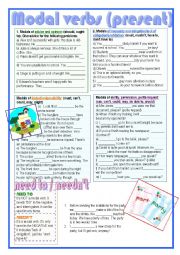



English Exercises Modals Should Shouldn T Mustn T




Must And Have Has To Baamboozle



Certainty Probability Possibility Modal Verbs




The Expressive Power Of Modal Verbs And Why Esl And Efl Students Avoid Them Efl Magazine




What Is Obligation In Modals Know It Info



Speculation And Deduction Modal Verbs




Using Perfect Infinitives With Modal Verbs English Grammar Eslbuzz Learning English




57 Free Have To Worksheets




Can Could Be Able To Must Can T May Might Could Deduction Must Have To Should Obligation English Lessons Learn English English Verbs
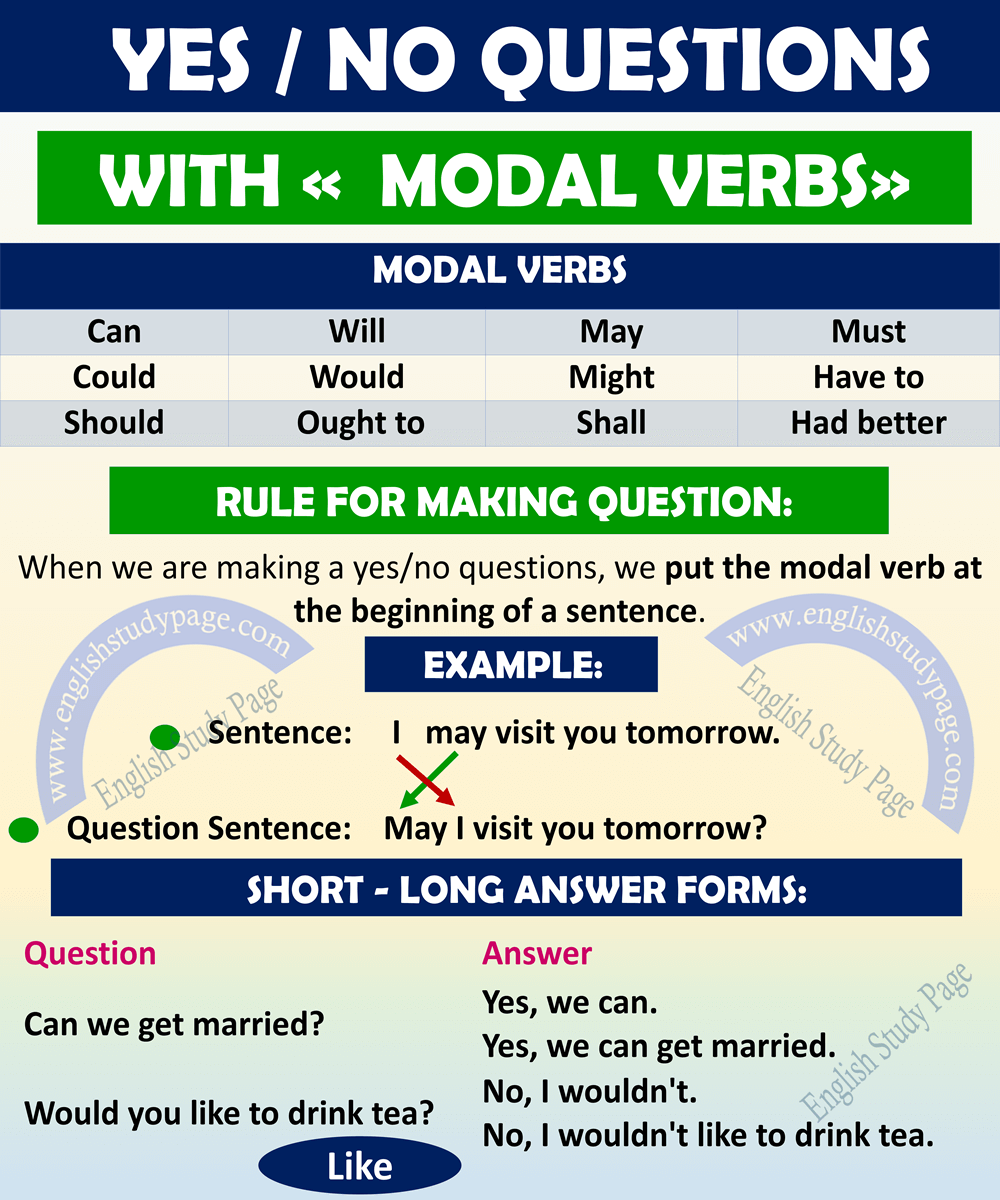



Yes No Questions With Modal Verbs English Study Page
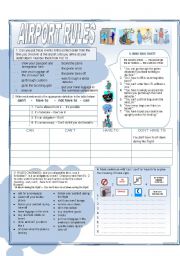



English Exercises Can Or Must




Modals Can May Must Worksheet
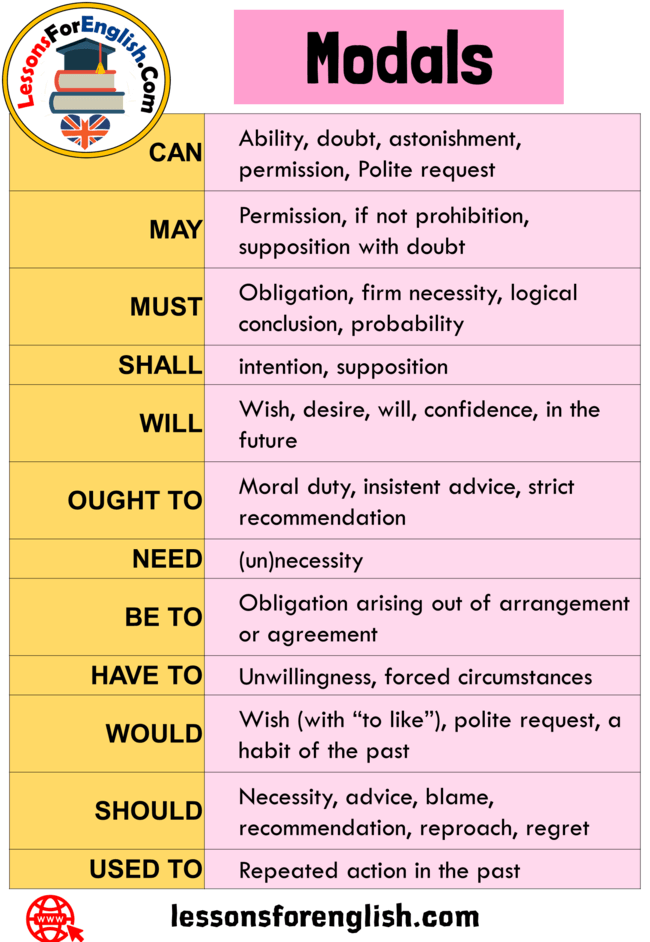



Modals Can May Must Shall Will Ought To Need Be To Have To Would Should Used To Lessons For English




Modals Can Could May Might Should Have To Must



1




Modal Verbs Worksheets And Online Exercises



Difference Between Have To And Must Difference Between




Mustn T Vs Don T Have To What Is The Difference Youtube




English Grammar Modal Verbs Eslbuzz Learning English
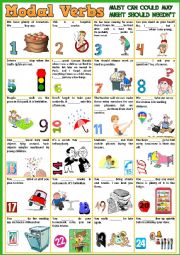



Modals Verbs Must Can Could May Might Should Needn T Key Esl Worksheet By Karagozian
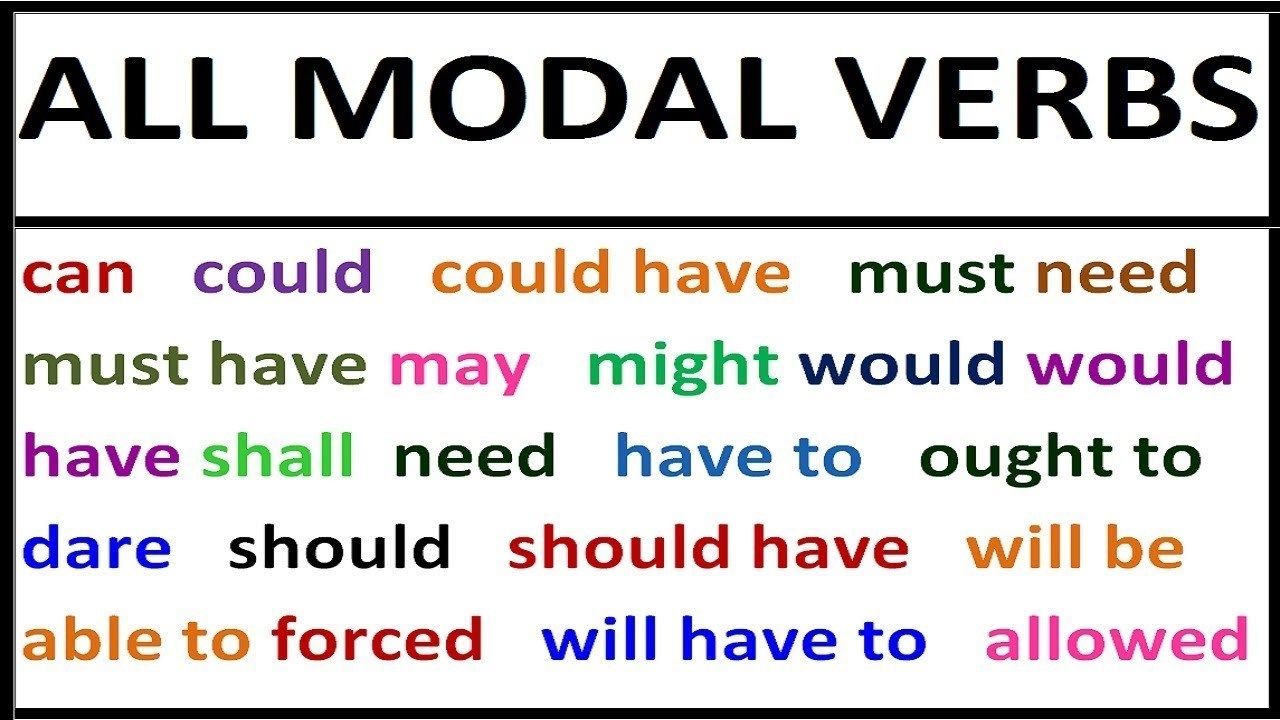



Modal Verbs Slide Set




ثمرات اللغة Language Thamarat Modal Verbs I Can Could May Might Must Need To Have To Should Ought To Had Better
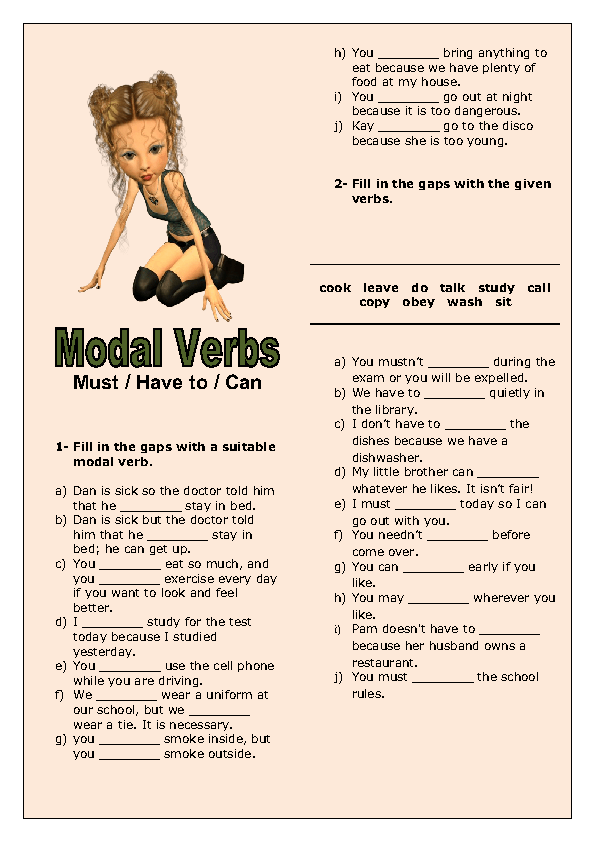



57 Free Have To Worksheets



Must Vs Have To Lessons Blendspace



0 件のコメント:
コメントを投稿